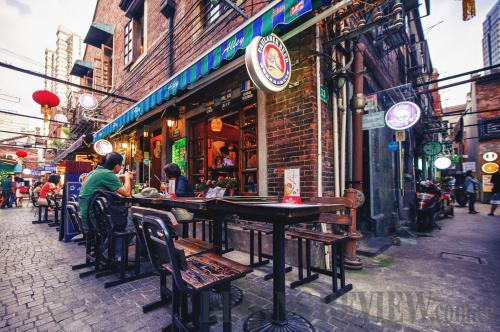|
 |
|
BUSINESS AREA: The Tianzifang Art Zone is now a major tourist destination in Shanghai (CFP) |
"I just moved into the new studio. It is still a mess, but I feel happy," Deke Erh said in his microblog on December 31, 2012, expressing bittersweet satisfaction at the end of a misfortunate year.
Two months earlier, the well-known Chinese photographer, also known as Er Dongqiang, was forced to move out of the Tianzifang Art Zone in Shanghai because he could no longer afford the rent.
Erh watched the former residential neighborhood evolve into an arts and crafts enclave, having located his studio there when the art zone was only just emerging from renovations in 2000. As tourism skyrocketed, so did the rent.
With his landlord unwilling to extend Erh's lease last fall, the Tianzifang Management Office asked Erh to move out before December. Erh reckons the landlord might find a tenant willing to pay more.
"Rent prices at the Tianzifang Art Zone have surged over the past few years as it has become more commercialized," Erh told Global Times, a Beijing-based newspaper.
Erh, 54, is renowned for his historic accounts of Shanghai's architectural and cultural development throughout his three-decade career in photography, so the closure of the Deke Erh Art Center is particularly heart-breaking.
The same scene played out in Beijing. Skyrocketing rents in Beijing's 798 Art District also forced out Xu Yong, a celebrated photographer of the city's hutong alleyways.
Xu received his eviction notice last October. Unwilling to reveal the actual rent of his studio, 798 Space, Xu told Youth Daily that the property owner raised the rent by 250 percent in 2012. Employees of the property owner locked the doors on Xu's studio on November 2, 2012, a day before it was scheduled to open its annual European Film Festival.
It took Xu a night of arguing and pleading with the property owner to get the doors opened for just one day.
The property owner, the Beijing Sevenstar Electronics Co. Ltd., would not allow Xu the last word. Iamdatong, a microblogger representing Sevenstar, countered on November 3 that due to the financial crisis in 2008, Xu was only charged 16 months' rent from 2008 to 2011.
Xu admitted he had benefited from preferential rental policies but said that the treatment had been earned. "My studio has contributed a lot to promoting arts and culture in the 798 Art District and has not earned much money," Xu told Global Times.
After the acquisition of the 798 Space by Sevenstar, the studio was reopened with the name Bauhaus Space and designated for hosting cultural activities for six months while parties consider a new rental agreement.
"I hope I can return and change it back to my 798 Space," said Xu.
Despite support from netizens and media outlets, Xu and Erh's departures are the latest in an exodus of high-profile artists from downtown enclaves that had been set aside for the creative industry. Many are heading toward low-rent suburbs.
In July 2012, the studio of the late oil painter Chen Yifei, another Tianzifang luminary, was summoned to court when it refused to move when its lease expired.
| 